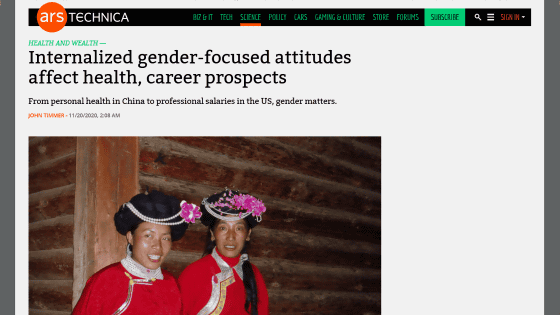Two studies show that gender norms in society affect gender health and salary differences

Not only do men and women look different, but men also have the biological difference of having a shorter lifespan than women and the social tendency of having more income. Two newly published studies show that gender differences in health and income depend not on biological differences, but on gender norms in the community and confidence in one's own abilities.
Matriliny reverses gender disparities in inflammation and hypertension among the Mosuo of China | PNAS
The confidence gap predicts the gender pay gap among STEM graduates | PNAS
https://www.pnas.org/content/117/48/30303
Internalized gender-focused attitudes affect health, career prospects | Ars Technica
https://arstechnica.com/science/2020/11/internalized-gender-focused-attitudes-affect-health-career-prospects/

Of the two treatises published by tech media Ars Technica, one focuses on
Focusing on the special circumstances of the Mosuo tribe, the research team investigated the signs of chronic disease in members of the matrilineal and paternal families and analyzed the differences between the two. The researchers used the signs of chronic inflammation and hypertension as signs of chronic disease, both of which are known to have significant health consequences.
As a result of the analysis, 3.2% of men and 8.3% of women suffer from chronic inflammation, 26% of men and 33% of women suffer from hypertension, and the percentage of women who have health problems in families with patrilineal customs. Turned out to be many. On the other hand, in families that maintain the maternal tradition, 6.4% of men with chronic inflammation and 3.6% of women, 28% of men with hypertension and 26% of women, and men have a higher proportion of health problems. I understand.
The research team speculates that the habit of continuing to live in the family in which they were born and raised influences the fact that men in the maternal society are in relatively better health than women in the paternal society. 'Health is broadly shaped by social and cultural factors, including gender norms that affect autonomy, wealth management and social support,' said the research team, who received the results of the analysis. He argued that the stress of things was offset by autonomy and so on.

The second treatise examines the salaries earned by American engineers. The research team tracked 559 students who graduated from engineering and computer science departments at 27 different universities for three years, and data such as salary, university grades, starting salary immediately after graduation, and industry. Was collected. He also investigated his confidence in his ability to perform tasks such as prototype construction and mathematical model construction, which the research team calls ' engineering self-efficacy .'
As it is generally said that women's salaries are lower than men's, the research team says that women who graduate from the same department earn less than men's average salary, about $ 5,000 a year. I found that there is a difference in. Although this gap narrowed considering factors such as grades and university name, it seems that there was still a salary gap between men and women.
However, when the research team adjusted the results based on 'engineering self-efficacy,' which is confidence in their skills, the gender pay gap was almost eliminated. In other words, it was not 'gender' but 'confidence in self-skills as an engineer' that best explained the wage gap between men and women, in other words, women tended to underestimate their skills more than men. .. In addition, 'the tendency to emphasize salary' and 'the tendency to emphasize workplace culture rather than salary' did not explain the wage gap between men and women.
Regarding the difference in confidence between men and women, the research team said, 'Previous studies have shown that women are less confident in their math and science abilities than men, regardless of their actual abilities. I pointed out.

'These reports emphasize that social factors can have a significant impact on gender differences,' Ars Technica said of two papers on how gender differences affect health and salary. He argued that gender differences need to be recognized as being caused by modifiable social factors, not by immutable biological factors.
Related Posts:
in Science, Posted by log1h_ik







